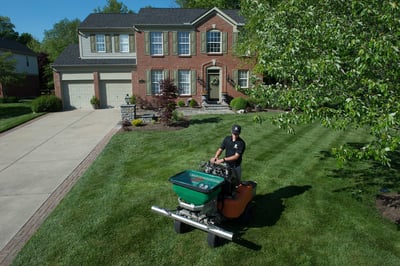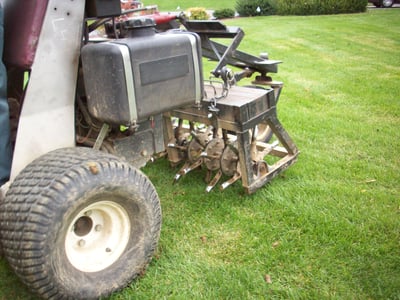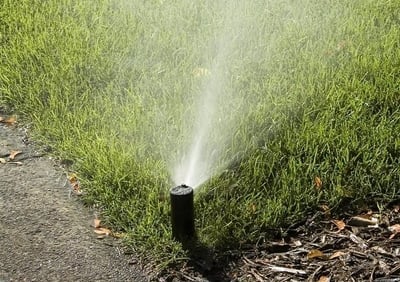When it comes to lawn care concerns, weeds are likely high on your list. Weeds popping up throughout the season take away from the overall beauty—and the enjoyment—of your lawn.
While you may have tried to get rid of weeds in the lawn, or maybe even hired a pro to handle it, there are some stubborn ones that just won’t seem to go away. You’re frustrated and you’re looking for a solution that will actually work.
The truth is, there could be a variety of reasons why weeds are sticking around. We’ll explore some of the most common reasons you may be struggling to get rid of weeds in your lawn, and what you can do about it.
1. Some Weeds Cannot Be Controlled Selectively
Weed control can be broken down into two main product categories: selective and non-selective. Selective weed controls, for the most part, will control one group of weeds without harming turfgrass, while non-selective weed control targets all vegetation (and will kill your turfgrass, too).
To protect your turfgrass, you want to choose selective control. For instance, the majority of broadleaf weeds (such as dandelions and clover) can be controlled by broadleaf weed control. There are also different variations of selective grassy weed control depending on what type of grassy weeds (such as crabgrass and nutsedge) you have in your yard.
The trouble is, some types of invasive weeds (like Bermudagrass and K-31 Tall Fescue) cannot be controlled selectively. This could be the reason why putting down certain products has not resulted in getting rid of weeds.
2. You’re Not Using the Best Weed Control Products
There are a lot more nuances involved in weed control than most people realize. To get rid of weeds in the lawn, you must be sure you’re using the right product on the right weed.
 If you’re taking a DIY approach to lawn care, chances are, you’re using a granular product or one of the very few options of over-the-counter liquid materials that are available. Neither option is going to be as effective as the products professionals have access to. For liquid weed control options, there are dozens of professional products with different formulations of active ingredients, all of which perform differently. However, only a few of these are available to homeowners.
If you’re taking a DIY approach to lawn care, chances are, you’re using a granular product or one of the very few options of over-the-counter liquid materials that are available. Neither option is going to be as effective as the products professionals have access to. For liquid weed control options, there are dozens of professional products with different formulations of active ingredients, all of which perform differently. However, only a few of these are available to homeowners.
With a granular product, there are some factors that complicate the process. The lawn has to be wet in order for enough product to stick to your weeds and then it has to remain rain-free for 24 hours in order to work. Unfortunately, there’s a lot of room for error in there. A professional-grade liquid application would be much more effective.
In addition, some more difficult-to-control weeds in our area such as crabgrass, nutsedge, or wild violet require a different approach. Even if you’re using a professional service, it’s possible that they’re not including those targeted applications in their program as it may be something they charge extra to do.
3. You’re Not Treating at the Right Time
If you want to get rid of weeds in your yard, you must be sure to target them at the right time. The truth is different weeds germinate at different times of the year and getting rid of them takes more than one application of control product a season. It must be a year-round, comprehensive approach using several different products.
In Cincinnati, Dayton, OH, and Northern Kentucky, troublesome spring weeds include dandelions and clover, while summer means the emergence of crabgrass, nutsedge, and summer annual broadleaf weeds. In fall, many weed varieties may re-emerge and the cycle of weed growth can start to feel never-ending, particularly with tough-to-control varieties such as wild violets and ground ivy.
It’s important to note that some weeds will require repeated control efforts (not a once-and-done treatment). It’s also important to recognize that weeds are most effectively controlled when they are treated during active growth, as weed control products are more easily translocated throughout the entire plant. This makes it imperative that weed control efforts are occurring at the right time. If you, or the professional service you’ve hired, aren’t switching up products based on season, then you’re probably not going to get rid of weeds in your lawn.
4. Your Soil is Compacted
Good soil health is incredibly important when it comes to growing healthy grass. Healthy soil promotes root growth and development. However, when soil becomes compacted, it puts a great amount of strain on your turf because it doesn’t allow nutrients, oxygen, and water to penetrate the soil.
 Conversely, there are a variety of weed species that have adapted to compacted soil conditions. Crabgrass, for instance, is an opportunistic weed that will thrive in compacted soil, quickly filling in bare spots where grass is struggling to grow.
Conversely, there are a variety of weed species that have adapted to compacted soil conditions. Crabgrass, for instance, is an opportunistic weed that will thrive in compacted soil, quickly filling in bare spots where grass is struggling to grow.
If you can’t seem to get rid of weeds in the lawn, solving your compaction problem may actually help your lawn to become thicker, resulting in less weeds. Fortunately, this is something that aeration can remedy by loosening up the soil and allowing more oxygen, water, and nutrients to penetrate below the surface where grass roots truly need them. Anything you do to promote a healthier lawn could ultimately lead to less weeds in the future.
5. Your Lawn is Too Thin
Having a thinned out lawn not only looks unappealing, it’s also a weed magnet. That’s because weeds thrive in thin and bare spots on your lawn where they don’t have to compete with healthy turf for the sunlight they need to grow.
You can combat this concern by having services performed that promote a healthy thick lawn. For instance, having overseeding performed at the time of aeration will encourage thick, healthy growth that will naturally choke out weeds. On top of that, regular fertilization will help thicken the lawn as well over time.
6. Your Lawn is Not Getting Enough Sunlight
 While grass needs approximately 5 to 7 hours of direct sunlight each day to thrive, there are some varieties of weeds that can grow in shady conditions. For instance, ground ivy and wild violets will pop up in shady areas and can quickly take over. If your lawn is not getting enough sunlight, you may need to look into pruning your trees or even removing them to allow more light to get through. This will help your grass to thrive, naturally choking out weeds.
While grass needs approximately 5 to 7 hours of direct sunlight each day to thrive, there are some varieties of weeds that can grow in shady conditions. For instance, ground ivy and wild violets will pop up in shady areas and can quickly take over. If your lawn is not getting enough sunlight, you may need to look into pruning your trees or even removing them to allow more light to get through. This will help your grass to thrive, naturally choking out weeds.
If you want to keep your trees and still have heavily shaded areas, you might consider alternative solutions such as adding some flower beds or mulched areas where you can’t get grass to grow thick and healthy.
7. You’re Not Mowing Properly
You might be surprised to know that your mowing habits can also have an impact on your struggle to get rid of weeds in the lawn. When you mow your grass too short or you scalp the edges along your walkways and driveway, you are creating conditions that may be favorable for weed growth.
As we mentioned, opportunistic weeds like crabgrass and many broadleaf varieties love thinned out areas of your lawn where it’s easy for them to get lots of access to the sun. To prevent this, we recommend mowing to a height of at least 3.5 inches. Doing so will also help your soil retain more moisture for your grass.
8. Your Lawn is Not Getting Enough Water
 In order for your grass to grow thick and healthy (and naturally defend itself against weeds) it needs water. But it’s possible your lawn may not be receiving enough.
In order for your grass to grow thick and healthy (and naturally defend itself against weeds) it needs water. But it’s possible your lawn may not be receiving enough.
Your lawn should be getting approximately one to two inches of water each week.
If it’s not raining enough to cover that, be sure to irrigate your lawn in order to keep it thick enough to discourage weeds from growing.
9. You Have a Soil Health Problem
While we mentioned soil health when we talked about compaction, there’s more to it than just compaction. Soil that is naturally healthy is full of beneficial microorganisms (such as beneficial fungi and bacteria) which are necessary for your grass to take advantage of the nutrients found natively in the soil and those provided by fertilizers. When these microorganisms are thriving in your soil, it will also help strengthen your lawn against disease and pests which could thin out your lawn and make it more prone to weeds.
If you are using a lawn care program that doesn’t address soil health (unfortunately even most professional lawn services do not), that could be the reason why you can’t get rid of weeds in your lawn.
A Comprehensive Approach to Get Rid of Weeds in Lawn
To sum it up, there is no single answer on how to get rid of weeds in your lawn. If your only approach to getting rid of the weeds in your lawn is to use the same, inferior products again and again, then you’re only treating the symptoms and not actually making any real progress. It’s like being stuck in an endless game of lawn care whack-a-mole, where you never actually get ahead.
 Instead, getting rid of weeds requires a multi-faceted approach that includes good habits such as aeration, overseeding, regular watering, proper mowing, and a lawn care program that promotes good soil health.
Instead, getting rid of weeds requires a multi-faceted approach that includes good habits such as aeration, overseeding, regular watering, proper mowing, and a lawn care program that promotes good soil health.
The efforts that we’ve talked about will help you produce a healthy lawn that is going to choke weeds out naturally by getting to the real root of the problem instead of just treating symptoms. In time, you may even require less weed control products if your healthy lawn is thick and thriving. Even so, there will always be those difficult-to-control weeds that could crop up making it equally important that a professional is regularly servicing your lawn and keeping an eye out for trouble.
While we know that weeds can be a huge source of frustration, they don’t have to be. By choosing the best program you can get on track to a healthy lawn that will keep the weeds out of your lawn and off your mind.
If you’d like a healthier lawn and want to learn more about the lawn care programs we offer in Cincinnati, Dayton, OH, or Northern Kentucky, request your quote, help us find the right program for you, and then sit back and relax as we transform your lawn.
